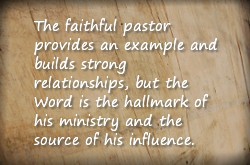Should the Church Have to Dispense Birth Control?
Body
Discussion
Toward Word-Centered Ministry
 Reposted, with permission, from My Two Cents.
Reposted, with permission, from My Two Cents.
Discussion
The Dirty Truth About Honoraria
Discussion
Beware Of The Bubble!
Discussion
The Other Gap Theory
 The full length version of this article appears in the November/December issue of Voice magazine.
The full length version of this article appears in the November/December issue of Voice magazine.
When we walk into a local grocery store in the U.S., we face an abundance of choices unlike anywhere else in the world. The cereal aisle alone is a great example of how companies strive to offer something for everyone. We see cereals for the health-conscious and sugary cereals with cartoon-filled boxes promising delicious taste, unique shapes and hidden toy prizes. We see cereals for those who like fruit, for those who like sweetness, for those who need fiber, and for those who just like their breakfast plain and simple.
American churches have also adopted this trend of specialization. Almost all churches strive to have something for everyone. Babies and infants have a nursery. Toddlers and preschoolers have their own class. Many churches offer Children’s Church for grade-school kids. And youth ministries have been developed to meet the needs of adolescents as they progress through junior high and high school. Many churches also offer adult women’s and men’s ministries and classes for married couples and senior saints.
But this church structure has flaws.
The gap for singles
A gap exists in this common ministry structure—one that poses a danger to the future of many churches. Churches provide ministry for children and young people from birth through high school, and beyond that age, adult ministries usually range from young married’s classes through ministries to the elderly members.
This structure would be perfect for young people who get married right out of high school; they can transition from the youth group to the young marrieds group. But what about the vast majority of high school graduates who move on to college or enter the workforce and remain single?
Discussion
Suspending worship in order to serve the community?
Body
Discussion
Should Laymen Be Allowed to Read the Bible? Part 1
 Reprinted with permission from As I See It. AISI is sent free to all who request it by writing to the editor at [email protected].
Reprinted with permission from As I See It. AISI is sent free to all who request it by writing to the editor at [email protected].
The problem stated
“If the average person is allowed to read and interpret the Bible for himself, isn’t he likely to misinterpret the Bible, and to misinterpret the Bible may have serious eternal spiritual consequences. Therefore, he dare not be allowed to interpret the Bible for himself, lest he err in his interpretation.”
The answer
I readily acknowledge that whenever people read and study the Bible for themselves they are guaranteed to misinterpret, misunderstand and misapply at least some of what they read. That is inevitable. But of course, the same is true if the same people read the newspaper, a textbook on chemistry or a magazine article on backyard gardening. Do we, then, forbid them to read and interpret these?
Does the fact of this certainty of to some degree misunderstanding the Bible, therefore, mean that either (1) the masses should not be allowed to have direct personal access to the Bible and/or (2) only authorized, authoritative interpreters of the Bible should be allowed to interpret for the rest of us what it means?
Some, such as the Roman Catholic Church, have appealed to 2 Peter 1:20 as proof of both of the assertions above. “No prophecy of the Scripture is of any private interpretation,” (emphasis added) is explained to mean that only Church authorities have the right to interpret the Scriptures and that all must follow that authoritative interpretation. However, in context, this verse is not speaking about those who read Scripture, but those who wrote Scripture. Verse 21 continues, “but being carried along by the Spirit, men spoke from God.”

Discussion